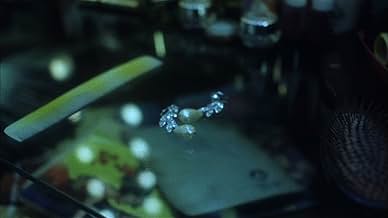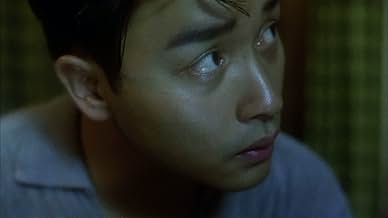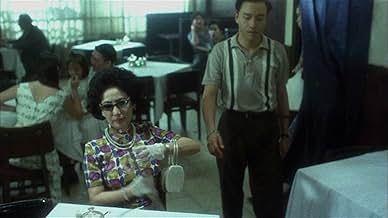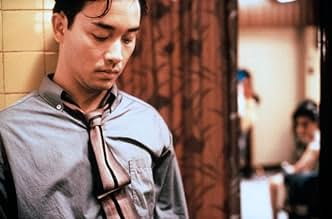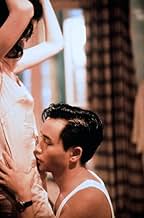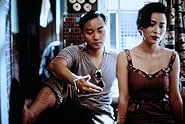ÉVALUATION IMDb
7,4/10
27 k
MA NOTE
Un homme essaie de découvrir qui est sa vraie mère après que la femme qui l'a élevé lui raconte la vérité.Un homme essaie de découvrir qui est sa vraie mère après que la femme qui l'a élevé lui raconte la vérité.Un homme essaie de découvrir qui est sa vraie mère après que la femme qui l'a élevé lui raconte la vérité.
- Prix
- 17 victoires et 9 nominations au total
Rebecca Pan
- Rebecca
- (as Tik-Wa Poon)
Tony Leung Chiu-wai
- Chow Mo-wan
- (as Tony Chiu Wai Leung)
Avis en vedette
There is an unpolished, raw, kind of grimy feeling to this film, one which maybe fits the sad, lonely little lives of these characters, few of whom are likeable. A young playboy (Leslie Cheung) who "hates work" treats a couple of women like disposable objects, and yet they can't seem to stop loving him. It's a type of story I'm not all that fond of, even if we gradually understand one of the things that seriously damaged him, and maybe made him into the self-centered asshole we see before us. His mother gave him up for adoption, and his stepmother only took him so she could get a regular paycheck. It was quite hard to empathize with him though, and I disliked the misogynistic overtones of the film. Even his nerdy friend gets in on it, slapping his second girlfriend (Carina Lau) around in the rain after she's been abandoned. My favorite moment was when a kind police officer tries to talk some sense into the first girlfriend (Maggie Cheung), and after they part, he narrates:
"I never really thought she'd call. But every time I passed by the phone booth, I'd stand there for a while. Maybe she's all right and she made it back to Macao. Or maybe she just needed someone to help her through that one night. Soon after that, my mother passed away, and I became a sailor."
The film desperately needed more humanizing touches like that, or some level of self-reflection or philosophy deeper than its bird metaphor. The painting of emptiness and loneliness that Wong Kar-wai gives us is undercut without it, though I did like some of the artistry in his camera work. Oh, and if you're as puzzled as I was about the character seen at the very end, it's a somewhat random/minor character who was meant to be the main character of the second part of the story, a film which was never made. Somehow the meaninglessness of that fits, though I'm not sure it's in a good way.
"I never really thought she'd call. But every time I passed by the phone booth, I'd stand there for a while. Maybe she's all right and she made it back to Macao. Or maybe she just needed someone to help her through that one night. Soon after that, my mother passed away, and I became a sailor."
The film desperately needed more humanizing touches like that, or some level of self-reflection or philosophy deeper than its bird metaphor. The painting of emptiness and loneliness that Wong Kar-wai gives us is undercut without it, though I did like some of the artistry in his camera work. Oh, and if you're as puzzled as I was about the character seen at the very end, it's a somewhat random/minor character who was meant to be the main character of the second part of the story, a film which was never made. Somehow the meaninglessness of that fits, though I'm not sure it's in a good way.
Kar Wai Wong's 2nd feature film is considerably more abstract than his first "As Tears Go By". so if you're looking for a good first Kar Wai Wong film to watch, you should probably start there.
"Days of Being Wild" reminded me very much of the classic French book "The Stranger" by Albert Camus; in fact I wonder if Kar Wai Wong may have been influenced by that book. Both stories center around a young man who is very unemotional except at times of explosive violence. Both stories show the young man to have severe mommy issues, i.e. a disconnection from his mother resulting in never learning how to show love and caring. And in both stories, the main character follows a very existentialistic path in life. He goes wherever life may take him with no connection to people or places.
The main character is not very likable. In fact he's a downright jerk toward women. But this ties in with the story of him trying to find his mother who abandoned him when he was a child. At the same time we see the interweaving of 4 other characters: 2 girlfriends, 1 devoted friend who falls for one of the girlfriends, and a policeman who enters the story by chance. Oh yeah, there's also the young man's rich aunt (adoptive mother) and a string of men she keeps.
It may be tough keeping up with all the characters, especially when the story starts moving to different locations. Certain events may seem random, but in the end it all comes together with a very poetic thought.
If you're a cinema geek, you'll love this film for its sheer technical achievements. A lot of scenes are shot with reflections & mirrors, allowing us to see the faces of different people simultaneously (without the camera jumping back & forth to whoever is talking). For example, the camera may be on a woman while she talks to a man. He is in front of the camera with his back to us, but we see his face & expressions in the reflection of a bathroom mirror behind the woman. Yea, I'm a cinema geek so I love stuff like that. If you like little details, you'll have a great time watching "Days of Being Wild".
"Days of Being Wild" reminded me very much of the classic French book "The Stranger" by Albert Camus; in fact I wonder if Kar Wai Wong may have been influenced by that book. Both stories center around a young man who is very unemotional except at times of explosive violence. Both stories show the young man to have severe mommy issues, i.e. a disconnection from his mother resulting in never learning how to show love and caring. And in both stories, the main character follows a very existentialistic path in life. He goes wherever life may take him with no connection to people or places.
The main character is not very likable. In fact he's a downright jerk toward women. But this ties in with the story of him trying to find his mother who abandoned him when he was a child. At the same time we see the interweaving of 4 other characters: 2 girlfriends, 1 devoted friend who falls for one of the girlfriends, and a policeman who enters the story by chance. Oh yeah, there's also the young man's rich aunt (adoptive mother) and a string of men she keeps.
It may be tough keeping up with all the characters, especially when the story starts moving to different locations. Certain events may seem random, but in the end it all comes together with a very poetic thought.
If you're a cinema geek, you'll love this film for its sheer technical achievements. A lot of scenes are shot with reflections & mirrors, allowing us to see the faces of different people simultaneously (without the camera jumping back & forth to whoever is talking). For example, the camera may be on a woman while she talks to a man. He is in front of the camera with his back to us, but we see his face & expressions in the reflection of a bathroom mirror behind the woman. Yea, I'm a cinema geek so I love stuff like that. If you like little details, you'll have a great time watching "Days of Being Wild".
This film was directed by the Chinese director, Wong Kar-Wai, who came to Western attention through his strange and quirky CHUNGKING EXPRESS. Because it was such an unusual and unique film, I decided to watch this other film. And, as in CHUNKING EXPRESS, DAYS OF BEING WILD was indeed a very unusual film--though with none of the kooky sensibilities of the other movie.
The film begins with a man trying to slowly ingratiate himself to a rather shy lady. Slowly but surely he is able to bring her out of her shell and after months of grooming her, he is able to bed her. To him, it's all a game and he has absolutely no regard for her or any other woman. But this nice lady is shattered and he could care less. Later, you see him pretty much doing the same thing in another self-centered relationship. While this is moderately interesting, what makes it even more so is his relationship with his foster mom. Their sick and dysfunctional interactions tell much about why he is who he is. The rest of the film concerns both of them as they separate and go their ways.
The DVD case compared this movie to the French film, LA RONDE. In most ways, this is very unfortunate, as both movies are excellent on their own and Wong Kar-Wai's film is not derivative. The only major similarities I saw is that both films involved sex and also showed how the two people at the beginning later had impact on others' behaviors as well. LA RONDE was about a large group of people and how sex (and an STD) unites them, while DAYS OF BEING WILD is about connections--and how some are unable to have deep or meaningful relationships. In this sense, it's a standout film. However, unfortunately, this also makes it a rather unpleasant film and is a bit difficult to watch--definitely NOT a date movie! It simply is NOT a fun film. But for someone who wants something with insights and is well directed and written, this is a film well worth seeing.
NOTE--While this film is about sexuality and the DVD case looks very steamy, there is no nudity in the film. This actually might be an excellent film for teens to see with their parents, as it opens up a great opportunity to talk about intimacy and sexuality--and how some cannot or will not combine the two.
The film begins with a man trying to slowly ingratiate himself to a rather shy lady. Slowly but surely he is able to bring her out of her shell and after months of grooming her, he is able to bed her. To him, it's all a game and he has absolutely no regard for her or any other woman. But this nice lady is shattered and he could care less. Later, you see him pretty much doing the same thing in another self-centered relationship. While this is moderately interesting, what makes it even more so is his relationship with his foster mom. Their sick and dysfunctional interactions tell much about why he is who he is. The rest of the film concerns both of them as they separate and go their ways.
The DVD case compared this movie to the French film, LA RONDE. In most ways, this is very unfortunate, as both movies are excellent on their own and Wong Kar-Wai's film is not derivative. The only major similarities I saw is that both films involved sex and also showed how the two people at the beginning later had impact on others' behaviors as well. LA RONDE was about a large group of people and how sex (and an STD) unites them, while DAYS OF BEING WILD is about connections--and how some are unable to have deep or meaningful relationships. In this sense, it's a standout film. However, unfortunately, this also makes it a rather unpleasant film and is a bit difficult to watch--definitely NOT a date movie! It simply is NOT a fun film. But for someone who wants something with insights and is well directed and written, this is a film well worth seeing.
NOTE--While this film is about sexuality and the DVD case looks very steamy, there is no nudity in the film. This actually might be an excellent film for teens to see with their parents, as it opens up a great opportunity to talk about intimacy and sexuality--and how some cannot or will not combine the two.
I guess the main reason that this is my favorite WKW movie is that it's one of the least abstract of his movies and I feel like the viewer becomes more emotionally involved with the characters because of that. The music, as always with WKW, is wonderful and the cinematography is fine, I especially like all the shots of the lush tropical forests. It isn't as beautifully photographed as many of his later films like chungking express and in the mood for love. And it doesn't feature much of the fancy techniques that WKW likes to employ in movies like fallen angels or happy together. Still I think this is my favorite of Wong Kar Wai's movies, not necessarily the best, but the one I enjoy the most. Highly Recommended.
Many people here seem to be of the opinion that this film is not very typical of Wong's work. I would like to disagree. To me, this film is a very typical Wong film. That is, if you are expecting the absolutely perfect colours, pictures and frames of 'In the Mood for Love', you will be disappointed. This film, like many of his other films, has a more rough quality to it.
All you who have seen 'In the Mood' and liked it should really see this film, as I don't think you can understand 'In the Mood' without having seen this one. I was not particularly overwhelmed by 'In the Mood', but now that I have seen this film, I at least understand the later film better. So maybe also those who did not like 'In the Mood' should see this one, as it might change their perception of that film.
To me Wong Kar-Wai's best film is still Chungking Express. And this film, although kind of in line with that film, does not reach up to that standard. I am glad I saw this film, as it explains other parts of Wong's work to me, but were it not for the sake of understanding that bigger picture, I don't think I would recommend it.
All you who have seen 'In the Mood' and liked it should really see this film, as I don't think you can understand 'In the Mood' without having seen this one. I was not particularly overwhelmed by 'In the Mood', but now that I have seen this film, I at least understand the later film better. So maybe also those who did not like 'In the Mood' should see this one, as it might change their perception of that film.
To me Wong Kar-Wai's best film is still Chungking Express. And this film, although kind of in line with that film, does not reach up to that standard. I am glad I saw this film, as it explains other parts of Wong's work to me, but were it not for the sake of understanding that bigger picture, I don't think I would recommend it.
Le saviez-vous
- AnecdotesThe film was supposed to be the first part of a project. But due to its relatively poor performance at the box office when it was first released, the producers decided not to finish the second part. The nameless character that appears in the last scene played by Tony Leung Chiu-wai is supposedly the main character in the second part.
- GaffesWhen Tide checks into the hotel, the hotel manageress hands him the key to Room 206. However, in the next scene, Tide uses the key to enter Room 204. This, however, may not be so much a 'goof' as another recurrence of the number '2046' seen so often in Wong Kar-Wai's films.
- Autres versionsA different 35mm print of the film features an altered prologue sequence and different edits during the final scenes of the film. This version decreases the length of the film from 95 to 94 minutes.
- ConnexionsFeatured in Nian ni ru xi (1997)
- Bandes originalesJungle Drums (Cantonese cover)
Music by Ernesto Lecuona & J. Cacabas
Lyrics by Sharon Chung
Performed by Anita Mui
Meilleurs choix
Connectez-vous pour évaluer et surveiller les recommandations personnalisées
- How long is Days of Being Wild?Propulsé par Alexa
Détails
Box-office
- Brut – États-Unis et Canada
- 146 310 $ US
- Fin de semaine d'ouverture – États-Unis et Canada
- 18 090 $ US
- 21 nov. 2004
- Brut – à l'échelle mondiale
- 3 257 906 $ US
- Durée
- 1h 35m(95 min)
- Couleur
- Rapport de forme
- 1.85 : 1
Contribuer à cette page
Suggérer une modification ou ajouter du contenu manquant


